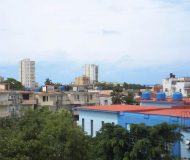WHY CUBA?
Mention Cuba and most people conjure up images of white sandy beaches and picturesque colonial buildings in the streets of Havana. Some may also think of Cuban cigars or Havana Club rum, while others might recall the country’s revolution and its charismatic leaders Fidel Castro and Che Guevara. However, there is much more to Cuba than these stereotypes and the island has a distinctive personality that some say haunts and helps the nation in equal measure.
The Real Deal
Decades of communist rule and trade embargoes meant that Cuba experienced significantly less tourism development than most other parts of the Caribbean and the island therefore retains a high level of cultural authenticity. Cities like Havana and Santiago de Cuba offer visitors a rare collection of 19th century Spanish colonial buildings interspersed with vibrant Art Deco architecture, and as the economic and cultural capitals of the country, they are alive with art, music, dance and cuisine.
The Cuban people are friendly, social and hospitable and it’s not uncommon for strangers to be invited along to someone’s birthday or wedding. In fact, impromptu parties and celebrations are the norm in Cuba and they offer a great way to get to know the local people and their culture.
Other classic Cuban experiences include dancing away the night in one of Santiago de Cuba’s many salsa venues or following in the footsteps of Ernest Hemingway with a classic cuban cocktail at the famous “La Floridita” in Old Havana.
Natural Attractions
For those wishing to be close to nature, Cuba’s long, sandy beaches are sure to impress, while offshore, you can experience the island’s rich underwater life and diverse coral reefs by taking a dive course or simply heading out with a snorkel and mask to explore the colourful reefs on your own.
Further inland, the island’s dense mangrove forests and lush mountain valleys offer a great opportunity to experience the country’s rich wildlife, which includes everything from hummingbirds to parrots, flamingos and crocodiles.
Back to the Future
With the collapse of the Soviet Union Cuba lost its main economic supporter and decades of subsidies ended. As a result, the country descended into economic crisis and even though it is far from the desolate outpost often portrayed in western media, it is still evident in many parts of the country that Cubans has been surviving on what little was available.
In some places you will see farmers tending to palm and sugar plantations with machinery that looks like it belongs to a different era and many items and comforts that most people take for granted have only recently become available in the island.
Since 2008, however, when Fidel Castro handed over power to his brother Raul, economic reforms have allowed individuals to own small businesses such as restaurants, home stays and private tour companies, while improved relations with the West have prompted a significant increase in tourism to the island.
In late 2014, US President Barack Obama announced a series of policy changes towards Cuba that saw full relations between the two countries restored. The historic trade embargo between the two countries has still not been lifted, but Cuba’s economic liberalization is already attracting plenty of US and international investment.
With ongoing economic growth bolstered by the continued expansion of the private sector and a healthy tourist economy that now represents 29% of Cuba’s total export earnings, there is no better time than now to visit and invest in this remarkable country.






